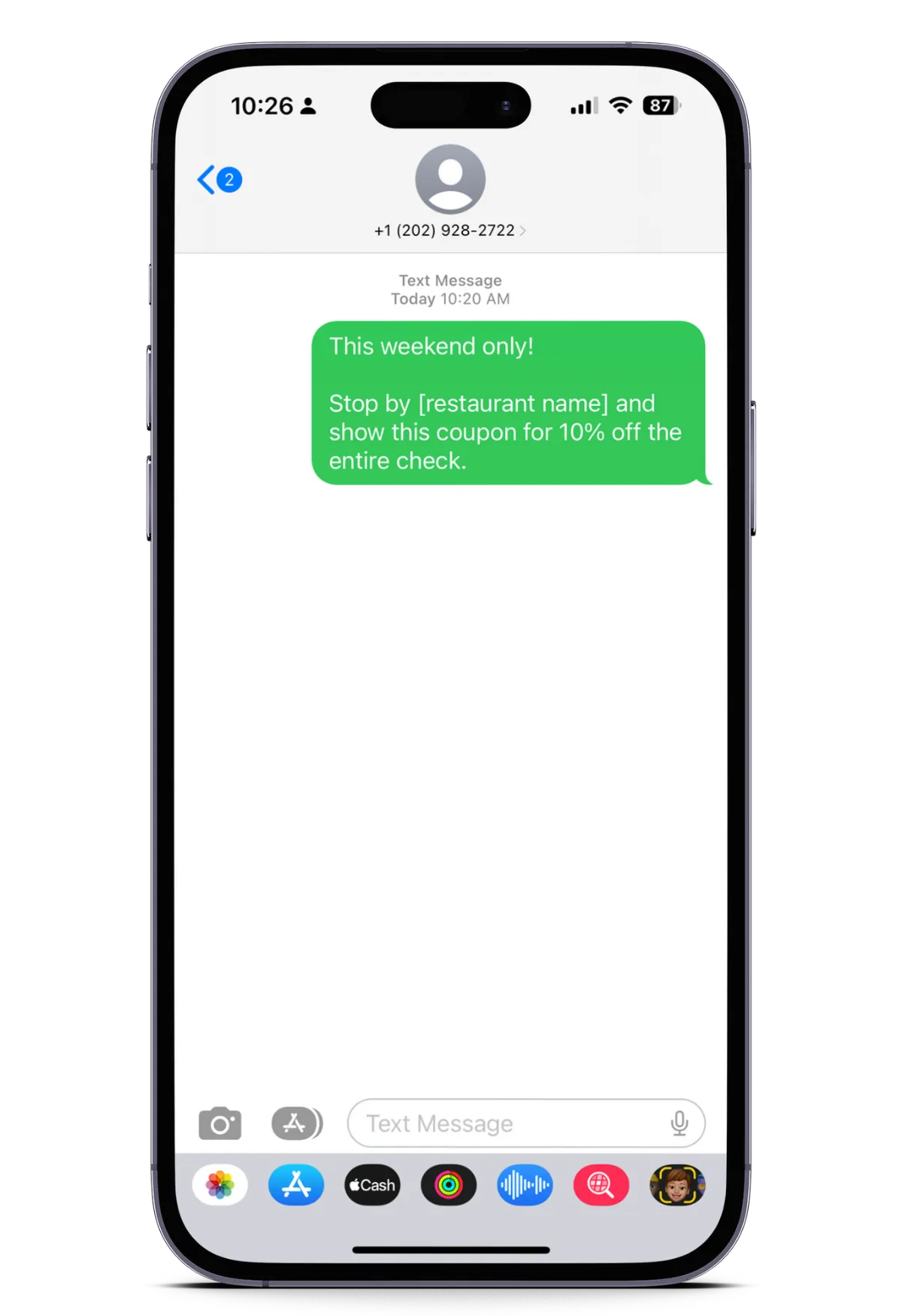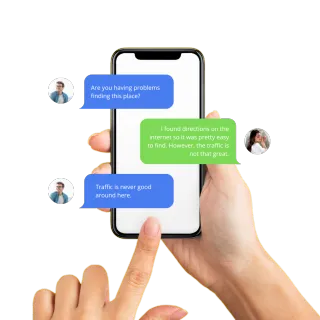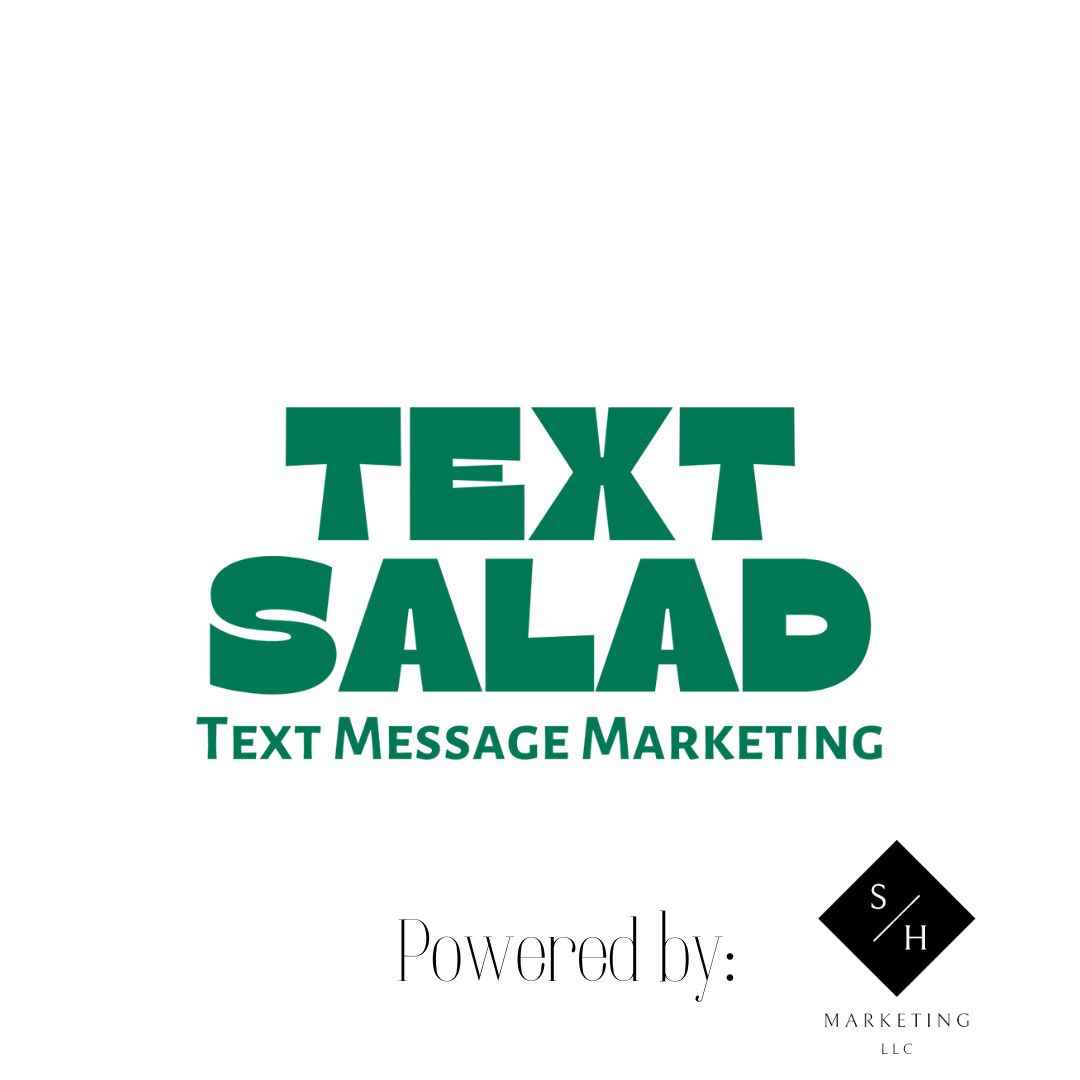"Empowering small businesses to succeed through integrated marketing solutions."
Growing
$39/Month
billed annually
($47 Monthly)
Free incoming messages
2400 messages/month
Everything in Starter
Established
$49/Month
billed annually
($57 Monthly)
Free incoming messages
4200 message/month
Everything in Growing
Pricing

Fully Integrated
Text Message Marketing
$49
(billed monthly)
(SMS/Emails Billed Separately )
Free incoming messages
email marketing
Dedicated Office Line
2-way text & email
AI Content Generation
Automated text campaigns
Automated Email Campaigns
Contact management
Funnels & Websites
Social Media Planner
Calendar
Pipeline management
voicemail drops
Invoices
Workflows
Triggers
Chat Widget
Integrated CRM
Forms
Mobile friendly app
"Empowering small businesses to succeed through integrated marketing solutions."
Pricing
Integrated Text Message Marketing
Essentials
(SMS + Email)
$97/m
Unlimited
(SMS + Email)
$197/m
(unlimited SMS)
(unlimited calls in)
(unlimited calls out)
(unlimited emails)
Dedicated office line
SMS Campaigns
Email Campaigns
Triggers
Pipelines/CRM
Social Planner
Workflows
Payments
Invoices
Forms
Calendar/Appointments
Funnels/Landing Pages
Automated Review Requests
Chat Widget
Facebook Lead Ad Integration
AI Content Generation
Upload contacts via .csv
FB Group Access
Dedicated office line
SMS Campaigns
Email Campaigns
Triggers
Pipelines/CRM
Social Planner
Workflows
Payments
Invoices
Forms
Calendar/Appointments
Funnels/Landing Pages
Automated Review Requests
Chat Widget
Facebook Lead Ad Integration
AI Content Generation
Upload contacts via .csv
FB Group Access
* Websites require a hosting and domain purchase
Frequently asked questions
What is text message marketing?
Text message marketing is a type of digital marketing that uses SMS messages to reach and engage customers. Businesses can send targeted and personalized promotions, updates, and offers directly to their customers' mobile devices. With text message marketing, businesses can benefit from high open rates, as the majority of text messages are read within minutes of being received. This allows for a direct and immediate connection with customers, increasing the chances of conversions and sales. Overall, text message marketing is an effective and cost-efficient way for businesses to reach and engage with their customers.

How do customers get on marketing list?
A QR code (Quick Response code) is a type of barcode that can be scanned with a smartphone camera to access information or a website. Businesses can use QR codes to obtain customer information by asking customers to scan a code in exchange for a promotion or reward. This information can then be stored in a database for future marketing efforts. By using QR codes, businesses can obtain customer information quickly and easily, allowing them to build their customer list and target their marketing efforts more effectively. Additionally, QR codes can be placed on flyers, posters, business cards, or any other promotional material, providing a convenient and accessible way for customers to engage with the business. Overall, using QR codes is a simple and effective way for businesses to obtain a customer list and improve their marketing efforts.

What is email marketing?
Email marketing is a digital marketing strategy that uses email to promote products, services, or brand messages to a target audience. Businesses can send mass email campaigns to their subscribers, consisting of newsletters, promotional offers, or other types of content. Email marketing allows businesses to reach a large audience and provide personalized experiences for their customers. It also provides the ability to track and measure the success of campaigns through metrics such as open rates, click-through rates, and conversions. With email marketing, businesses can nurture relationships with their customers, drive traffic to their website, and ultimately grow their customer base. It is an effective and cost-efficient way for businesses to communicate with their target audience and build lasting relationships with their customers.

What is a CRM?
A CRM (Customer Relationship Management) is a software system that helps businesses manage and analyze customer interactions and data throughout the customer lifecycle. It integrates customer information, such as sales, marketing, and customer service data, into one centralized platform. The aim of a CRM system is to improve customer relationships, drive sales, and increase customer satisfaction. By using a CRM system, businesses can improve their customer engagement, increase customer loyalty, and drive sales. In short, a CRM is a tool for businesses to manage and improve their customer relationships.

What is an Integrated Calendar?
An integrated calendar is a scheduling tool that integrates with other software systems and platforms. It allows users to manage their appointments, tasks, and events in one centralized location, streamlining their workflow and improving productivity. An integrated calendar can be synced with other tools, such as email, CRM, and project management systems, providing a complete overview of a user's schedule and tasks.

What is Rep. Management?
Reputation management in regards to online reviews refers to the practice of monitoring and addressing customer reviews and ratings posted on websites such as Yelp and Google. This involves regularly monitoring these sites for new reviews, responding to both positive and negative feedback in a professional and helpful manner, and taking steps to improve customer satisfaction and maintain a positive online reputation. The goal is to manage the online perception of an individual or organization and enhance their reputation through positive customer experiences and feedback.

How does Rep. Management help my business?
Reputation management services can help businesses monitor online reviews and respond to negative feedback before it goes live on websites like Google and Yelp. These services typically use software and tools to track and notify businesses of new reviews in real-time, allowing them to respond promptly and proactively. By addressing negative feedback before it is publicly visible, businesses can mitigate the damage to their reputation and potentially turn negative reviews into positive ones. This can improve the overall perception of the business and help maintain a strong online reputation, which is critical for attracting and retaining customers. Adding reputation management services can provide peace of mind for businesses, allowing them to focus on running their operations while knowing their online reputation is being monitored and protected.

What is a funnel/landing page?
Funnels and landing pages are both important components of digital marketing strategies that aim to convert website visitors into leads or customers. A funnel refers to the series of steps or stages that a potential customer goes through in their journey from being aware of a product or service to making a purchase decision. Funnels are designed to guide visitors through a specific path, with each step strategically crafted to move them closer to taking the desired action, such as making a purchase or signing up for a newsletter. Funnels often involve multiple touchpoints, such as email marketing, social media campaigns, and website content, to nurture leads and drive conversions.
On the other hand, landing pages are standalone web pages that are specifically designed to capture visitor information or prompt a specific action. They are often used in conjunction with marketing campaigns to provide a focused and targeted experience for visitors. Landing pages are typically optimized to drive conversions by offering valuable content, showcasing a product or service, or presenting an enticing offer. They typically have clear call-to-action buttons or forms to encourage visitors to take the desired action, such as providing their contact information or making a purchase.








© 2018. All rights reserved by SH Marketing, LLC.
